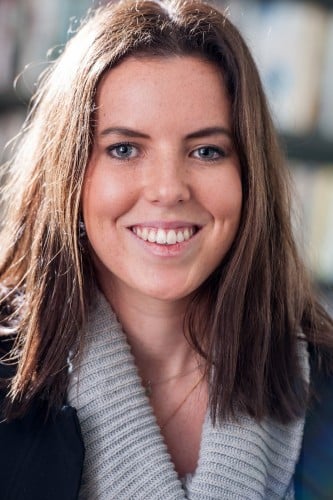 Sophie Hardcastle is an exciting young writer from Sydney. After writing her first (unpublished) novel at fifteen, Sophie was misdiagnosed with major depression the following year. She was admitted to hospital four times over the next two years.
Sophie Hardcastle is an exciting young writer from Sydney. After writing her first (unpublished) novel at fifteen, Sophie was misdiagnosed with major depression the following year. She was admitted to hospital four times over the next two years.
Running Like China is her engaging, lyrical and brave story of her mental illness; her attempts to ‘fix’ herself with drugs, alcohol and sex; and her family’s anguish.
Better Reading spoke to Sophie Hardcastle about her experience writing Running Like China, her relationship with family, her advocacy work and her promising future as a talented novelist.
Better Reading: Running Like China is a brave and beautiful book, and an extraordinarily vivid account of your experiences and your emotional states at different times. What inspired you to write about your experience with bipolar disorder, and what do you hope readers take away from the book?
Sophie Hardcastle: I was studying fine arts and while I like writing essays and painting, I realised it’s not what I love. When I accepted madness will interrupt my life whether I like it or not, I decided there was no point wasting time doing something I wasn’t in love with. I am obsessed with writing so it felt only natural to start typing away. I had been working on a novel when I was fifteen and people asked why I hadn’t gone back to it. I told them I would later but that Running like China was a story I needed to get out now!
I hope readers will see the importance of opening the conversation around mental health and that they will be encouraged to do so. I also hope that my book will inspire resilience and encourage patience, because there are so many moments worth waiting for.
Most of all, I’d love to think that people will ground themselves in their everyday lives – that they’ll listen more intently, that they’ll love with their whole hearts and maybe deepen their laugh. I want people to celebrate the madness and live within crowded hours.
BR: Your family – especially your parents and sister – are a significant part of this story and your book gives us a very strong sense of your relationship and the impact your illness has had on them. How did they react to the idea of you writing Running Like China? Have they read it?
SH: My sister and dad thought it was fantastic that I was doing something I loved. Mum was a little apprehensive. She was worried about what people would think about our family and whether they would judge her for being a ‘bad’ mum. The book has had the opposite effect though and I think everyone has been able to see her for the strong, courageous woman that she is.
They’ve all read it now and I think each of them grieved in their own way. It’s very difficult to reface such difficult times as it opens the flood gates to a torrent of emotions and memories. I think we’re all better off for it now though. It’s given us clarity and brought us a lot closer as a family.
BR: You write about the damage caused by keeping silent about mental illness, and we understand you’re now working with the not-for-profit group Batyr. Can you tell us a little more about that work?
SH: Batyr is all about story telling. We go into schools and run workshops where Batyr speakers give a voice to the elephant in the room by sharing their own experiences with mental illness.
By the end of the program the turnaround in the students’ attitudes towards mental health is amazing. Hearing others talk openly and honestly gives the students confidence to open up in their own lives. It inspires hope.
BR: You’ve known from the age of 15, or even before then, that you were going to be a writer, and the events in Running Like China end with you beginning a professional writing career (speaking to a literary agency, enrolling in a playwriting course and taking on a magazine writing job). Can you tell us more about the publication process for this book?
SH: I was very fortunate because a lot of doors were opened for me. There were several people in the publishing industry that felt this story was an important one to be told so they really rallied behind me.
I was introduced to one person who introduced me to another, who introduced me to an editor who helped on my first major structural edit.
Soon after that, I was introduced to Selwa Anthony who now represents me. Having her take me under her wing was very validating and I think that’s when I knew it was getting serious. Selwa and her daughter Linda have given me so much love and support; I can’t imagine this book would be on the shelves without them.
A few months later, Hachette Australia offered me a book deal. Everyone at Hachette is amazing; they’re like one big family and I feel so privileged to be one of their authors. Bolinda Audio then took on my book as an audio book, which was unreal. They too have been loving and supportive.
In the end though, whether it took me a year, ten years or fifty years to get published, I knew I wasn’t going to be happy doing anything else. And maybe it’s that passion that attracted the publishers. I love writing; I’m obsessed with it. Getting paid now is just a bonus.
BR: You frequently draw on quotes from your journals in the book. How important has the process of writing been in “enduring the long winter” of your illness?
SH: I have always kept journals. Since I learnt how to write, I have been writing in diaries, on notepads and in books, and for a while it was what kept me going. Though the winter was bitter and long, that one little part of me stayed the same. Perhaps it was my connection to the real world.
Writing in journals also helped me to express things I couldn’t explain to others, so in a sense it was a release. At the same time, it gave me a way of documenting my moods. Now I can look back and see patterns in my episodes, which is very helpful in learning how to better live with this illness.
BR: Are you working on any other writing projects right now?
SH: I’m currently working with my publisher and in-house editor from Hachette on my debut novel Breathing Under Water, which is being published in July 2016. I’m also at uni finishing my Fine Arts degree so I’m swamped at the moment with essays, but I love it so I’m definitely not complaining.
BR: Books, words and art have been important to you throughout your life. Which classic or contemporary Australian authors have inspired you?
SH: Tim Winton. My mum and dad read to my sister and me when we were young every night. My two favourites were Tim Winton’s The Deep and Blue Back. The ocean is integral to both stories and I think that really resonated with me.
Read an extract of Running Like China on the publisher’s website.
Stay up to date with all the latest book news by subscribing to our emails.






Leave a Reply